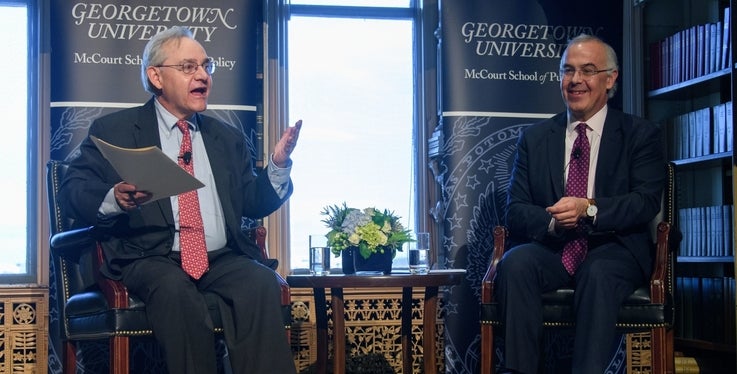NY Times Columnist David Brooks Discusses Cultural Change
New York Times columnist David Brooks explored how America might restore a sense of national unity in America during the 2018 Whittington Lecture Feb. 15 at Georgetown.

New York Times columnist David Brooks explored how we might restore a sense of national unity in America during the 2018 Whittington Lecture on Feb. 15 at Georgetown.
“History does have these pivotal moments,” Brooks said. “…moments where countries all around the world are facing the same sort of problem.”
E.J. Dionne, professor at the McCourt School of Public Policy and political columnist at The Washington Post, moderated the discussion with Brooks after the lecture.
Brooks said the nation is facing three overlapping social crises – a crisis of social solidarity, in which community has been replaced by loneliness;a crisis of trust in institutions that makes it difficult for people to work together to solve problems; and a crisis of meaning.
“When you get a lonely, nakedly individualistic, atomized, alienated culture, it’s a recipe for tribalism, … and we see it around the world with the rise of populism,” Brooks said.
A Hatchet Moment
Brooks described cultural change as a process of hatcheting and ratcheting.
“We ratchet up, we solve a problem. It lasts for a little while,” he explains. “It stops working, so we hatchet, we dig it apart. It’s a bumpy period. Then we pivot, we find something new, and we ratchet again.”
We are living in a hatchet moment where the old system isn’t working and we have to find something new, the columnist said.
“Donald Trump may not be good for much, but he’s really good at destroying old orthodoxies,” … Brooks said. “The old order is collapsing, and so something new is going to happen, and we just need faith in human ingenuity.”
Restoring Faith in our Politics
“One of the things we have to restore faith in … is a faith in politics,” he said. “If you organize a diverse society, you can settle things through force or through politics.”
The journalist encouraged the students and members of the Georgetown community in the audience to consider serving in public service and said public service and politics call forth the highest virtues.
“There are certain things that politics demand. Sagacity, prudence, really listening to and understanding other people, flexibility, wisdom, forbearance – these virtues are hard to get at any other level,” he said.
The Whittington Lecture and Scholarship
The Whittington Lecture was established in memory of Leslie A. Whittington, associate dean and professor of public policy at Georgetown who, along with her husband and two children, died on September 11, 2001.
The forum honors her commitment to investigating pressing public policy issues by providing a forum for thoughtful dialogue with policy and political leaders.
Previous Whittington lecturers have included U.S. Labor Secretary Thomas Perez, Sen. Elizabeth Warren (D-Massachusetts) and U.S. House Speaker Paul Ryan (R-Wisconsin).
Additionally, a McCourt student who excels academically and shows a strong commitment to community service is awarded the Whittington Scholarship each year.
This year’s scholar, Rachael Kauss (G’18), introduced Brooks and Dionne during the lecture.
Kauss, will graduate this spring with masters degrees in public policy and foreign service.
Her academic excellence has earned her a GPA placing her in the top 5 percent and she keeps active in the McCourt, Georgetown and D.C. communities, serving as the co-president of McCourt’s Women in Public Policy Initiative and as a member of Marlon Marshall’s student strategy team through Georgetown’s Institute of Politics and Public Service.
In 2016, Kauss earned the President’s Volunteer Service Award for over 100 hours of community service with organizations including the Girl Scouts, Higher Achievement and Hillary Clinton’s presidential campaign.
- Tagged
- Events